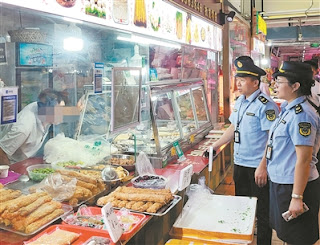According to the "borax pork" warning, borax was discovered during a "surprise inspection" of two food market vendors selling meatballs and pork in Panyu--a manufacturing hub and satellite city of Guangzhou in south China. Inspectors seized a box of borax used by a vendor to clean pig intestines, and chemical testing detected borax in some samples of meat. The inspection was carried out jointly by market supervision officials and police. Panyu police are prosecuting those responsible and local authorities are cracking down on the use of additives and borax, the article said.
[According to WebMD borax is a white powdery substance that combines boron, sodium and oxygen. It is commonly used as a household cleanser, a laundry detergent additive, and other uses. If ingested in large doses it can cause kidney problems. Borax is banned for use in food in both the U.S. and China.]
 |
| Staged photo of inspectors checking for borax-adulterated pork products in Panyu, China. |
Why was the discovery of 2 samples of tainted meat in a single market in southern China considered to be important enough to circulate all over the Chinese internet? Was it, in fact, news?
Chinese propagandists appear to be salting news media with reports of "borax pork" to warn consumers of a widespread and chronic problem. They report what appear to be small, isolated incidents in southern factory towns to hide the scope of the problem. The articles sow suspicion of small vendors to drive food business to supermarket chains which authorities believe they can control more easily.
In August 2023, Hong Kong news media reported that borax-contaminated pork was discovered in Zhuhai, another city in Guangdong Province. Again, borax was discovered on pork from 3 vendors who had been turned over to police.
In June 2023, Shanghai publication The Paper had posted a lengthy article, "Borax pork appearing on the market--what is it?" reporting the story of retired "Uncle Zhao" who became suspicious of a pork vendor after reading an article online about borax-contaminated pork. The article noted that Chinese Central TV had once reported that borax was detected in pork sold by 3 vendors in Nanning City of Guangxi Province (2015 report preserved by bannedbook.org) and went on to explain why vendors treat their pork with borax, its dangers and how to watch out for it. Like the recent Guangzhou Daily article, The Paper article cited an example from Panyu, but it was a Panyu Daily article from 2015--8 years ago.
Similar but different facts were reported in another 2015 Guangzhou Daily article which again gave 3 examples of pork vendors prosecuted for adding borax to pork. These vendors sold pork in Dongguan, another industrial satellite city of Guangzhou, and each was identified as coming from small cities and towns elsewhere in Guangdong Province.
 |
| Vendor accused of adulterating pork with borax in court, 2011 |
China's Baidu has an article on "borax pork" that posts a number of clips from news media outlets warning about "borax pork."
Another article circulated on Chinese web sites in June featured warnings from physicians that ingesting even one gram of borax used on pork could be toxic.
In June 2023 inspectors in Taiwan's New Taipei City discovered 2 food samples adulterated with borax. They had discovered 1 adulterated sample in 2018.
In December 2022, a lengthy article issued by a Jiangsu Province news outlet warned consumers about the borax pork problem.
In 2020, Hong Kong media reported announcements that borax pork adulteration was discovered in Shanxi and Fujian Provinces.
Guangdong Province issued a warning about borax in pork as early as 2011, demonstrating that the problem has been around more than two decades.
What we can discern from picking through these reports is that use of borax to clean up pork is pervasive in China and has been for 2 decades or more. Authorities want to warn consumers about the problem, but news media have been instructed to only report 2 or 3 isolated cases in far-away industrial towns to cover up the pervasiveness of the problem. The articles blame evil or ignorant vendors to deflect blame from government officials. No cases have been reported in retail chain food outlets which are favored by Chinese leaders.
A corollary is that monitoring news media reports in China is not an accurate means of monitoring what's actually going on. News media report only what the regime wants the public to know. These reports are reposted on social media, so monitoring social media results in the same outcome. Borax adulteration of meat occurs in China all the time, but news media handlers choose when to intermittently salt the media with reports to boost crackdown campaigns.
A result of news media control is a fragmentation of the public into an ill-informed segment who accept the reports and another segment who distrust news media because they have discovered the manipulation. This leads to dysfunction and is not unique to China. The threat is present anywhere news media are controlled by an elite minority.



No comments:
Post a Comment